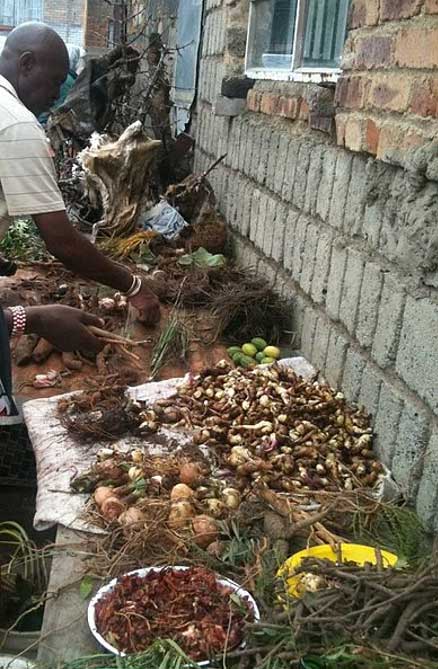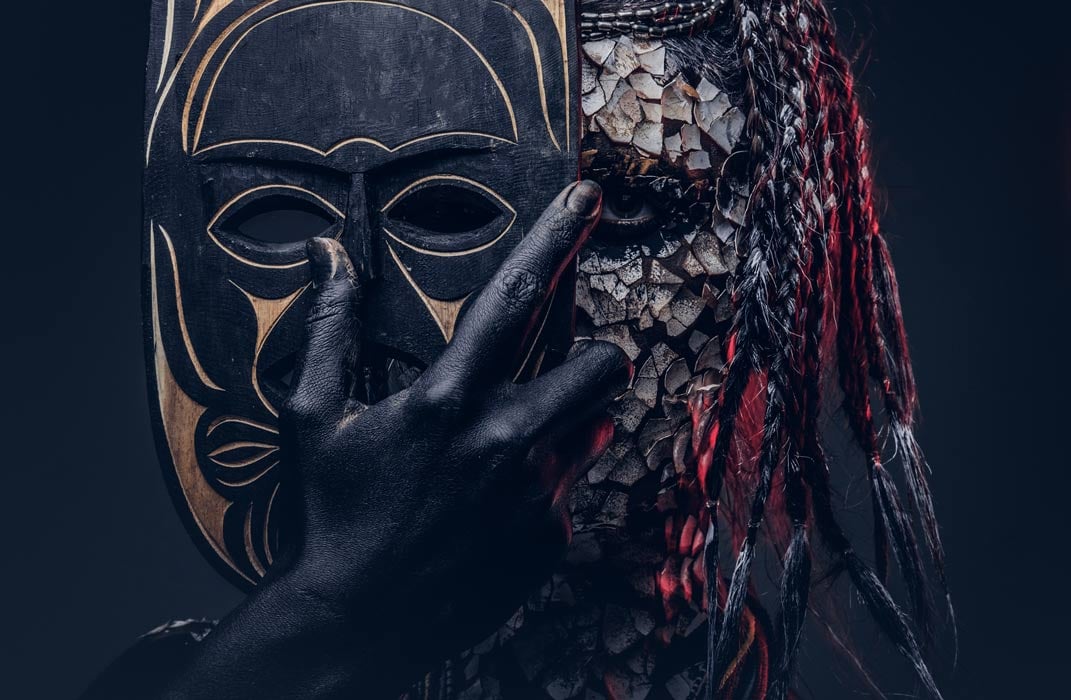Traditional African Medicine and its Role in Healing in a Modern World
Herbalism, divination, and spiritualism often combine in traditional African medicine, perhaps the oldest and most varied therapeutic system in the world. This holistic health care system has many practitioners and followers and despite its decline for a period of time, traditional African medicine has resurged across the continent in recent years.
According to the World Health Organization (WHO), it has been estimated that “about 80% of the population in developing countries depends on traditional medicine for their Primary Health Care (PHC) needs.” What is presently known as ‘conventional medicine’ has its origins in the West.

N’anga (spiritual healer or herbalist) of the Shona people. Great Zimbabwe, Zimbabwe. (CC BY SA 3.0 )
Though this is arguably the most prominent form of medicine today, it is not accessible to, or the first choice for, everyone. Therefore, many still rely on traditional medicine even today. Some forms of traditional medicine include: traditional Chinese medicine, Ayurvedic medicine (which has origins in ancient Indian society), and traditional African medicine. It is the last of these examples that this article will examine.
- Uncovering the ancient roots of leprosy
- Ayurvedic Medicine: A Traditional Knowledge of Life from India that Has Endured the Passage of Time
- A Glimpse into the Intuitive Medicine of the Native American Tradition
The Prevalence of Traditional African Medicine
In the continent of Africa, traditional (or ancestral) African medicine seems to be much more prevalent compared to conventional, Western medicine. In West Africa, for instance, it has been estimated that between 70-80% of the population rely on traditional medicine. Such figures, however, are not unique to that part of Africa alone, but may even be applied to the whole continent. In the countries of the WHO - African Region, it has been claimed that “60-80% of people rely on African traditional medicine for their primary health care.”
A Holistic Approach
One major difference between conventional, Western medicine and traditional African medicine, is the way of viewing illnesses and their treatments. Unlike its Western counter-part, traditional African medicine is said to take a holistic approach, which is based on the premise of interconnectedness, and often includes indigenous herbalism in its treatment.

Traditional healer preparing and drying out herbs. Johannesburg, South Africa. (CC BY SA 3.0)
According to traditional African belief, human beings are made up of various aspects – physical, spiritual, moral, and social. When these parts function together harmoniously, a person will be in good health. On the other hand, if any of these features are out of balance, a person will become physically, or even spiritually, ill. Thus, illness is not viewed as just a physical disorder, but could also be a spiritual, moral, or social disorder. Similarly, the treatment of an ill person involves not only aiding his/her physical being, but may also involve the spiritual, moral, and social components of being as well.

Sangoma performing a traditional African blessing of protection on a baby. Johannesburg, South Africa. (CC BY SA 3.0)
Secret Medicine Societies
Practitioners of traditional African medicine are quite different from doctors who practice conventional medicine. It has been said that the former are often priestesses, high priests, diviners, midwives, and herbalists, and are known by different names in different parts of Africa, including sangoma, n’anga, and inyanga.
- Medical marijuana: Modern hunter-gatherers may use cannabis to treat intestinal infections
- Could ancient textbooks be the source of the next medical breakthrough?
- The Incredible Medical Interventions of the Monks of Soutra Aisle
It has also been said that prior to attaining an education in traditional African medicine, one is often required to be initiated into a secret society, as many characteristics of this form of medicine can only be passed down to initiates. The knowledge of traditional African medicine has often been handed down orally, frequently in the form of stories, from one generation to the next.

Welcoming of sangoma initiates. (CC BY SA 3.0)
Colonial Stigmas Against Traditional African Medicine
During the colonial period, the arrival of Western medicine had a negative impact on traditional African medicine. For instance, ancestral medicine was viewed as inferior, and therefore was stigmatized and marginalized. As a result, the development of this branch of African knowledge was stymied for a long time. In some extreme cases, traditional African medicine was completely banned, due to its association with ‘witchcraft.’ In the eyes of the colonists, this supposed ‘witchcraft’ was regarded as ‘backward’ and ‘superstitious’ and therefore something undesirable that they believed should be eliminated.

A Niam-Niam medicine man or shaman, equatorial Africa. (CC BY 4.0)
It is not clear as to the degree of success achieved by the efforts of the colonialists to eradicate traditional African medicine. Although the colonial authorities were able to pass laws banning the practice, it would probably have been nearly impossible to stop people from practicing it. Even if they were successful in their efforts, the WHO estimations show that there is a modern resurgence in this practice. Rather than attempting to get rid of traditional African medicine, a contemporary approach shows that it may be far more beneficial to try to learn from traditional practices and work with the practitioners to combat illnesses in Africa.
Protecting Traditional Knowledge
Numerous studies have been conducted on traditional African medicine. The aims of these studies regularly include the protection of this ancestral form of knowledge, the use of such a system to complement the conventional one, and the way forward for traditional African medicine in the 21st century.
For example, as such a high percentage of Africans are thought to seek the aid of a traditional healer when they are ill, the practitioners could help in the fight against HIV/AIDS. Furthermore, organizations trying to combine traditional African and conventional Western medicine hope to be able to train traditional healers to, amongst other things, raise awareness amongst locals about the disease, serve as counsellors, and combat the spread of this disease. Thus, the progressive view is to see how the holistic style of treatment may also be a complimentary method to the Western version of medicine.
Top Image: Traditional African medicine is a holistic practice often involving herbalism, divination, and spiritualism. Source: Fxquadro /Adobe
By: Ḏḥwty
References
Abdullahi, A. A., 2011. Trends and Challenges of Traditional Medicine in Africa. Available at: http://www.ncbi.nlm.nih.gov/pmc/articles/PMC3252714/
Busia, K. & Kasilo, O. M., 2010. Overview of Traditional Medicine in ECOWAS Member States. Available at: http://www.aho.afro.who.int/en/ahm/issue/13/reports/overview-traditional-medicine-ecowas-member-states
Davis, T., 2012. Traditional African Healing. Available at: http://www.africanholocaust.net/news_ah/traditionalhealing.html
Kasilo, O. M., Trapsida, J.-M., Mwikisa, C. N. & Lusamba-Dikassa, P. S., 2010. An Overview of the Traditional Medicine Situation in the African Region. Available at: http://www.aho.afro.who.int/en/ahm/issue/13/reports/overview-traditional-medicine-situation-african-region
Kennedy, E., 2015. Traditional African Medicine: Herbalism, Spirituality and Treating HIV/AIDS. Available at: http://www.empowher.com/aids-hiv/content/traditional-african-medicine-herbalism-spirituality-and-treating-hivaids
Mham, P. P., Busia, K. & Kasilo, O. M., 2010. Clinical practices of African traditional medicine. Available at: https://www.aho.afro.who.int/en/ahm/issue/13/reports/clinical-practices-african-traditional-medicine
Science Museum, London, 2015. African medical traditions. Available at: http://www.sciencemuseum.org.uk/broughttolife/techniques/africanmedtrad.aspx
Stanley, B., 2015. Recognition and respect for African traditional medicine. Available at: http://www.idrc.ca/EN/Resources/Publications/Pages/ArticleDetails.aspx?PublicationID=713


















Comments
Despite my strong commitment to preserving traditions, I believe that our advancements in the field of medicine is for our own good. Yes, traditional medicine has its merits but I have more trust our medicine today. Just see how we’ve made various products all of which are derived from hemp. Advancements like these can be found from relevant sources online like https://area52.com/. Let’s keep traditions alive, but let’s not get stuck in the past is all I want to say.
I would like to thank that if African medicine had not been stunted and it's growth that maybe there would have been many discoveries that could have been beneficial to multiple diseases and illnesses in the world today.
A.R.Maddox
Good day everyone, i'm Marie, If getting herpes cure was that easy then why do a lot of people still suffer from herpes?. i was diagnosed of herpes back in 2013 and i was also told it has no cure, i have been leaving with it since then, but i kept praying and doing everything possible to get cured, so i never stopped doing research about finding a cure, i came across testimonies about people getting cured through herbal medication, and i have always believe in herbs and its medical properties, after doing so many research about it i found Dr. Bulukona and i discovered he was a professional in herbal medication and he has also helped many people, i contacted him through his Website: bulukonaherbalsolution.webs.com , we talked on phone and i confirmed he was genuine, i did all what he told me to do, i received the medicine, used it as he has prescribed, and glory be to God almighty i am completely cured, i went back to my doctor to confirm it. Do not be deceived THERE IS A CURE FOR HERPES, doctors might tell you there is no cure but WITH HERBAL MEDICATION THERE IS A CURE and if you need it contact Dr. Bulukona Email: [email protected],
lnterested to learn more ...verification